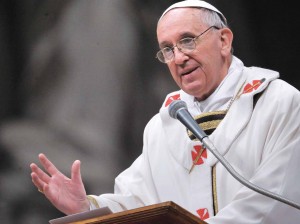Front Row With Francis: The Gift of Fortitude
 “Courage is almost a contradiction in terms. It means a strong desire to live taking the form of a readiness to die.” –GK Chesterton, Orthodoxy
“Courage is almost a contradiction in terms. It means a strong desire to live taking the form of a readiness to die.” –GK Chesterton, Orthodoxy
Continuing his Catechesis on the gifts of the Holy Spirit, Pope Francis used this week’s lesson to discuss the gift of fortitude. When we consider the Gifts of the Spirit, fortitude is rarely one that any of us would call to mind. It is an interior virtue that is only manifest during times of trial.
What is fortitude? Thomas Aquinas defines it, generally, “as simply denoting a certain firmness of mind,” and he even defines it as a necessary virtue since every virtue requires the ability “to act firmly and immovably” (ST II-II 123,2). It is numbered among the gifts of the spirit in Isaiah 11:2 along with wisdom, understanding, and counsel—the first three Gifts that the Holy Father reflected upon in his Catechesis. Pope Francis said of these first three gifts that they “enable us to contemplate God’s loving plan and to know his will,” and the gift of fortitude enables us to have the strength to do God’s will, even in times of trial.
We often think of fortitude as denoting a foolhardiness or recklessness with one’s life. In this context, it is rather more of strength in spirit that can withstand the general struggles that all Christians go through as well as the extraordinary trials such as persecution. In the heart of a Christian, fortitude is necessary for all the other gifts to fully take root and to grow into an unshakable faith.
The Holy Father made reference to Christ’s parable of the sower and the seeds. In Matthew 13 Christ gives a parable where seeds are scattered and, while many are consumed by birds or grow to die, a few actually hit the soil and blossom. Pope Francis discusses the seeds which were scattered in the rocky soil and at first spring into plants but, because they lacked a deep bed of earth, withered and died when they tried to take root.
Unique among the parables of Christ, the Lord actually gives an explanation for this parable and elucidates what the seeds on the stony grown signify. Christ states:
“And he that received the seed upon stony ground, is he that heareth the word, and immediately receiveth it with joy. Yet hath he not root in himself, but is only for a time: and when there ariseth tribulation and persecution because of the word, he is presently scandalized (Matthew 13:20-21).”
Pope Francis notes that this parable applies to many of us for, “The seed of God’s word sown in our hearts can encounter not only interior resistance, but also be choked by life’s sufferings and trials.” The seeds of faith can easily take blossom in us, but how often do they start to wither when we encounter the slightest suffering and difficulty?
While it’s a popular Christian cliché to say, “God will never give you more than you can handle,” we have all been to a point where the tragedies of life can overtake us as if were a small ship in a storm. Like the seeds in Christ’s parable, we were eager and found immediate life in faith, but the rockiness of our days can keep us from going deeper. The good news is that God did not abandon us, but is with us and can even give us the grace to stand and grow.
The Holy Spirit can dispense to us the gift of fortitude so that the seeds of faith find a rich soil to take root and withstand any trials that come upon us. This gift of fortitude is exercised daily through prayer and meditation, seeking to find the strength to endure our days. As Pope Francis assures us:
“Through the gift of fortitude, the Holy Spirit enables us to remain faithful amid every difficulty and – as the experience of so many Christians around the world shows – even amid persecution and martyrdom.”
Especially in this time of persecution in the Middle East, Africa, and (increasingly) in other parts of the world, we need to seek the Holy Spirit for the gift of fortitude to strengthen our faith; to provide that deep, rich earth that we can stand firm in.

